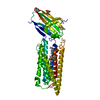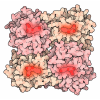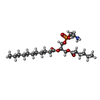+ Open data
Open data
- Basic information
Basic information
| Entry | Database: PDB / ID: 8kb4 | ||||||
|---|---|---|---|---|---|---|---|
| Title | Cryo-EM structure of human TMEM87A A308M | ||||||
 Components Components | Transmembrane protein 87A,EGFP | ||||||
 Keywords Keywords | MEMBRANE PROTEIN / non-selective cation channel / ion channel / Golgi-localized protein | ||||||
| Function / homology |  Function and homology information Function and homology informationdetection of mechanical stimulus involved in sensory perception of touch / retrograde transport, endosome to Golgi / Golgi cisterna membrane / RHOA GTPase cycle / ruffle / bioluminescence / generation of precursor metabolites and energy / cellular response to mechanical stimulus / Golgi membrane / Golgi apparatus ...detection of mechanical stimulus involved in sensory perception of touch / retrograde transport, endosome to Golgi / Golgi cisterna membrane / RHOA GTPase cycle / ruffle / bioluminescence / generation of precursor metabolites and energy / cellular response to mechanical stimulus / Golgi membrane / Golgi apparatus / plasma membrane / cytosol Similarity search - Function | ||||||
| Biological species |  Homo sapiens (human) Homo sapiens (human)  Human adenovirus C serotype 2 Human adenovirus C serotype 2 | ||||||
| Method | ELECTRON MICROSCOPY / single particle reconstruction / cryo EM / Resolution: 3.1 Å | ||||||
 Authors Authors | Han, A. / Kim, H.M. | ||||||
| Funding support |  Korea, Republic Of, 1items Korea, Republic Of, 1items
| ||||||
 Citation Citation |  Journal: Nat Commun / Year: 2024 Journal: Nat Commun / Year: 2024Title: GolpHCat (TMEM87A), a unique voltage-dependent cation channel in Golgi apparatus, contributes to Golgi-pH maintenance and hippocampus-dependent memory. Authors: Hyunji Kang / Ah-Reum Han / Aihua Zhang / Heejin Jeong / Wuhyun Koh / Jung Moo Lee / Hayeon Lee / Hee Young Jo / Miguel A Maria-Solano / Mridula Bhalla / Jea Kwon / Woo Suk Roh / Jimin Yang ...Authors: Hyunji Kang / Ah-Reum Han / Aihua Zhang / Heejin Jeong / Wuhyun Koh / Jung Moo Lee / Hayeon Lee / Hee Young Jo / Miguel A Maria-Solano / Mridula Bhalla / Jea Kwon / Woo Suk Roh / Jimin Yang / Hyun Joo An / Sun Choi / Ho Min Kim / C Justin Lee /  Abstract: Impaired ion channels regulating Golgi pH lead to structural alterations in the Golgi apparatus, such as fragmentation, which is found, along with cognitive impairment, in Alzheimer's disease. ...Impaired ion channels regulating Golgi pH lead to structural alterations in the Golgi apparatus, such as fragmentation, which is found, along with cognitive impairment, in Alzheimer's disease. However, the causal relationship between altered Golgi structure and cognitive impairment remains elusive due to the lack of understanding of ion channels in the Golgi apparatus of brain cells. Here, we identify that a transmembrane protein TMEM87A, renamed Golgi-pH-regulating cation channel (GolpHCat), expressed in astrocytes and neurons that contributes to hippocampus-dependent memory. We find that GolpHCat displays unique voltage-dependent currents, which is potently inhibited by gluconate. Additionally, we gain structural insights into the ion conduction through GolpHCat at the molecular level by determining three high-resolution cryogenic-electron microscopy structures of human GolpHCat. GolpHCat-knockout mice show fragmented Golgi morphology and altered protein glycosylation and functions in the hippocampus, leading to impaired spatial memory. These findings suggest a molecular target for Golgi-related diseases and cognitive impairment. | ||||||
| History |
|
- Structure visualization
Structure visualization
| Structure viewer | Molecule:  Molmil Molmil Jmol/JSmol Jmol/JSmol |
|---|
- Downloads & links
Downloads & links
- Download
Download
| PDBx/mmCIF format |  8kb4.cif.gz 8kb4.cif.gz | 100.4 KB | Display |  PDBx/mmCIF format PDBx/mmCIF format |
|---|---|---|---|---|
| PDB format |  pdb8kb4.ent.gz pdb8kb4.ent.gz | 68.6 KB | Display |  PDB format PDB format |
| PDBx/mmJSON format |  8kb4.json.gz 8kb4.json.gz | Tree view |  PDBx/mmJSON format PDBx/mmJSON format | |
| Others |  Other downloads Other downloads |
-Validation report
| Arichive directory |  https://data.pdbj.org/pub/pdb/validation_reports/kb/8kb4 https://data.pdbj.org/pub/pdb/validation_reports/kb/8kb4 ftp://data.pdbj.org/pub/pdb/validation_reports/kb/8kb4 ftp://data.pdbj.org/pub/pdb/validation_reports/kb/8kb4 | HTTPS FTP |
|---|
-Related structure data
| Related structure data |  37069MC  8hsiC  8httC C: citing same article ( M: map data used to model this data |
|---|---|
| Similar structure data | Similarity search - Function & homology  F&H Search F&H Search |
- Links
Links
- Assembly
Assembly
| Deposited unit | 
|
|---|---|
| 1 |
|
- Components
Components
| #1: Protein | Mass: 96983.539 Da / Num. of mol.: 1 / Mutation: A308M Source method: isolated from a genetically manipulated source Details: Transmembrane protein 87A A308M with GFP and twin strep tag Source: (gene. exp.)  Homo sapiens (human), (gene. exp.) Homo sapiens (human), (gene. exp.)   Human adenovirus C serotype 2 Human adenovirus C serotype 2Gene: TMEM87A / Cell (production host): Expi293F / Cell line (production host): HEK293F / Production host:  Homo sapiens (human) / References: UniProt: Q8NBN3, UniProt: A0A6M5E0N3 Homo sapiens (human) / References: UniProt: Q8NBN3, UniProt: A0A6M5E0N3 | ||||||
|---|---|---|---|---|---|---|---|
| #2: Sugar | | #3: Chemical | ChemComp-65I / ( | Has ligand of interest | Y | Has protein modification | Y | |
-Experimental details
-Experiment
| Experiment | Method: ELECTRON MICROSCOPY |
|---|---|
| EM experiment | Aggregation state: PARTICLE / 3D reconstruction method: single particle reconstruction |
- Sample preparation
Sample preparation
| Component | Name: Transmembrane protein 87A A308M with GFP tag and Twin-strep tag Type: ORGANELLE OR CELLULAR COMPONENT Details: Transmembrane protein 87A A308M with GFP tag and Twin-strep tag purified with detergent LMNG/CHS Entity ID: #1 / Source: MULTIPLE SOURCES | |||||||||||||||||||||||||
|---|---|---|---|---|---|---|---|---|---|---|---|---|---|---|---|---|---|---|---|---|---|---|---|---|---|---|
| Molecular weight | Experimental value: NO | |||||||||||||||||||||||||
| Source (natural) | Organism:  Homo sapiens (human) Homo sapiens (human) | |||||||||||||||||||||||||
| Source (recombinant) | Organism:  Homo sapiens (human) / Cell: Expi293F / Plasmid: pcDNA3.4 TOPO Homo sapiens (human) / Cell: Expi293F / Plasmid: pcDNA3.4 TOPO | |||||||||||||||||||||||||
| Buffer solution | pH: 9 Details: 50mM HEPES pH 7.5, 250mM NaCl, 0.01% (w/v) LMNG, 0.002% (w/v) CHS | |||||||||||||||||||||||||
| Buffer component |
| |||||||||||||||||||||||||
| Specimen | Conc.: 0.8 mg/ml / Embedding applied: NO / Shadowing applied: NO / Staining applied: NO / Vitrification applied: YES / Details: This sample was monodisperse | |||||||||||||||||||||||||
| Specimen support | Details: The grid was negatively glow-discharged for 60 sec with 15mA | |||||||||||||||||||||||||
| Vitrification | Instrument: FEI VITROBOT MARK IV / Cryogen name: ETHANE / Humidity: 100 % / Chamber temperature: 277 K |
- Electron microscopy imaging
Electron microscopy imaging
| Experimental equipment |  Model: Titan Krios / Image courtesy: FEI Company |
|---|---|
| Microscopy | Model: FEI TITAN KRIOS / Details: Using Zemlin tableau in sherpa |
| Electron gun | Electron source:  FIELD EMISSION GUN / Accelerating voltage: 300 kV / Illumination mode: FLOOD BEAM FIELD EMISSION GUN / Accelerating voltage: 300 kV / Illumination mode: FLOOD BEAM |
| Electron lens | Mode: BRIGHT FIELD / Nominal magnification: 105000 X / Calibrated magnification: 58900 X / Nominal defocus max: 1900 nm / Nominal defocus min: 800 nm / Cs: 2.7 mm / C2 aperture diameter: 70 µm / Alignment procedure: COMA FREE |
| Specimen holder | Cryogen: NITROGEN / Specimen holder model: FEI TITAN KRIOS AUTOGRID HOLDER / Residual tilt: 10 mradians |
| Image recording | Average exposure time: 6.09 sec. / Electron dose: 67.7 e/Å2 / Film or detector model: GATAN K3 BIOQUANTUM (6k x 4k) / Num. of grids imaged: 1 / Num. of real images: 4565 |
| EM imaging optics | Energyfilter name: GIF Bioquantum / Energyfilter slit width: 20 eV |
| Image scans | Width: 5760 / Height: 4092 |
- Processing
Processing
| EM software |
| ||||||||||||||||||||||||||||||||||||||||||||||||||
|---|---|---|---|---|---|---|---|---|---|---|---|---|---|---|---|---|---|---|---|---|---|---|---|---|---|---|---|---|---|---|---|---|---|---|---|---|---|---|---|---|---|---|---|---|---|---|---|---|---|---|---|
| CTF correction | Details: PatchCTF in Cryosparc was used / Type: PHASE FLIPPING AND AMPLITUDE CORRECTION | ||||||||||||||||||||||||||||||||||||||||||||||||||
| Particle selection | Num. of particles selected: 8101104 Details: 96,330 particles were first picked using a blob picker of cryoSPARC. 2D class average images were generated as templates for subsequent reference-based auto-picking. | ||||||||||||||||||||||||||||||||||||||||||||||||||
| 3D reconstruction | Resolution: 3.1 Å / Resolution method: FSC 0.143 CUT-OFF / Num. of particles: 360876 / Symmetry type: POINT | ||||||||||||||||||||||||||||||||||||||||||||||||||
| Atomic model building | B value: 40 / Protocol: RIGID BODY FIT / Space: REAL Details: Chimera Fit in map tool was used for initial local fitting. Then, Real-space refinement with the rigid body option in PHENIX was used for flexible fitting. | ||||||||||||||||||||||||||||||||||||||||||||||||||
| Refine LS restraints |
|
 Movie
Movie Controller
Controller





 PDBj
PDBj






